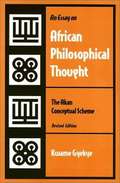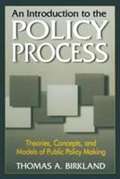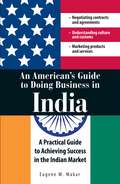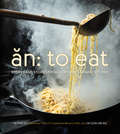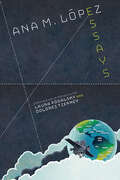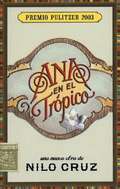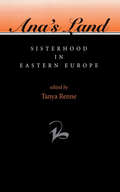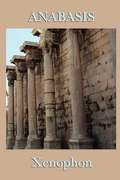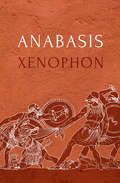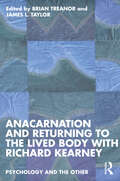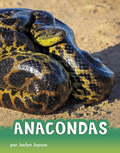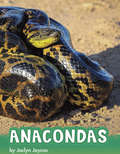- Table View
- List View
An der Hochschule lehren: Praktische Ratschläge, Tricks und Lehrmethoden
by Markus BrauerWenn es Ihnen wie den meisten Ihrer Kollegen geht, erhalten Sie als Dozent oder Doktorand keine Grundausbildung in Didaktik und Pädagogik für Ihre Hochschullehre. Es scheint als ob die Fähigkeit, Studierende zu unterrichten und sie in ihrem Lernen zu fördern, eine Selbstverständlichkeit wäre. Das ist natürlich falsch, und das Ziel dieses Buch ist es, diese Lücke zu füllen und Sie in Ihrer Lehre zu unterstützen.Forschungen über die Aufmerksamkeit, das Gedächtnis und die Motivation haben es ermöglicht, Lehrmethoden zu entwickeln, die das Verstehen und Lernen der Studierenden maximieren. Diese Lehrmethoden integrieren unter anderem das "aktive Lernen", das sich durch eine aktive Teilnahme der Studierenden am Lernprozess auszeichnet.Pragmatisch und praktisch werden in diesem Buch die didaktischen Methoden vorgestellt, die "funktionieren". Sie erfahren, wie Sie diese in großen Veranstaltungen (Vorlesungen) und kleinen Veranstaltungen (Seminare, Übungen) anwenden können. Dieses Buch enthält viele praktische und konkrete Hinweise für die Lehre, behandelt aber auch andere für Sie wichtige Themen wie Prüfungen, das "Schwätzen", die Motivation der Studierenden, und Zeitmanagement.Wenn Sie Lehrender an Universitäten oder Fachhochschulen sind, dann ist dieses Buch unentbehrlich für Sie. Aber auch jene, die in der Erwachsenenbildung tätig sind, werden die vielen pädagogischen Hinweise nützlich finden. Nach dem Lesen dieses Buches werden Sie nicht nur besser unterrichten, Sie werden auch mehr Spaß an Ihrem Beruf haben.
An die Spitze im E-Commerce: Neues Wachstum im Online-Handel durch überlegene Differenzierung
by Stefan ClausingDieses Buch ist ein wertvoller Leitfaden für Online-Händler, die in einer sich ständig verändernden Branche langfristiges Wachstum erreichen wollen. Stefan Clausing bietet dafür pragmatische Strategien an, ohne dabei zu „fancy“ zu werden. Die Welt des E-Commerce hat in den letzten Jahrzehnten eine rasante Entwicklung erlebt, die durch die SARS-CoV-2-Pandemie ihren vorläufigen Höhepunkt fand. Doch im Jahr 2022 trübte sich die Stimmung ein. Der Online-Handel wurde erstmals mit negativem Wachstum konfrontiert. Jetzt ist es an der Zeit, sich als Online-Shopbetreiber neu aufzustellen. Dieses Buch bietet eine Bestandsaufnahme und zeigt, wie Sie die Chancen nutzen und den Risiken begegnen können.Aus dem InhaltVeränderung ist die Norm: Wie Wachstum im dynamischen Umfeld des E-Commerce gelingt.Positionierung ist der Schlüssel: Vom tiefen Verständnis von Ihrer Zielgruppe zu einer überzeugenden Positionierung.Traffic und Kundenakquise: Kundengewinnung als dauerhafte Herausforderung – Übersicht der wichtigsten Instrumente, um Kunden durch den Kaufentscheidungsprozess zu führen und zu Wiederholungskäufern zu machen.Datenschutz und Marketing: Hand in Hand mit einer klugen Datenstrategie und einer ausgewogenen Budgetierung über den gesamten Conversion Funnel. Customer Relationship Management: Wie Sie anhand des Customer Lifetime Value (CLV) und Kohortenanalysen die Kundenbindung steigern.Ethik im E-Commerce: Wie das Streben nach Gewinnmaximierung nicht auf Kosten des Kundenmehrwerts geht. „An die Spitze im E-Commerce“ bietet eine ganzheitliche Perspektive auf die Herausforderungen und Chancen im digitalen Handel – sowohl für große Online-Shops als auch für KMUs und Selbständige. Die ausgewogenen Ansätze und praktischen Erkenntnisse machen dieses Buch zu einem klugen Ratgeber für Online-Verkäufer, die nachhaltig wachsen und langfristig erfolgreich sein möchten.
An essay on African philosophical thought The Akan conceptual scheme (Revised edition)
by Kwame GyekyeDefining the main principles of a distinct African philosophy, this work rejects the idea that an African philosophy consists simply of the work of Africans writing on philosophy. It argues that critical analyses of specific traditional African modes of thought are necessary to develop a distinctively African philosophy.
An introduction to Confucianism
by Xinzhong YaoTaking into account the long history and wide range of Confucian Studies, this book introduces Confucianism - initiated in China by Confucius (551 BC–479 BC) - primarily as a philosophical and religious tradition. It pays attention to Confucianism in both the West and the East, focussing on the tradition's doctrines, schools, rituals, sacred places and terminology, but also stressing the adaptations, transformations and new thinking taking place in modern times. Xinzhong Yao presents Confucianism as a tradition with many dimensions and as an ancient tradition with contemporary appeal. This gives the reader a richer and clearer view of how Confucianism functioned in the past and of what it means in the present. A Chinese scholar based in the West, he draws together the many strands of Confucianism in a style accessible to students, teachers, and general readers interested in one of the world's major religious traditions.
An introduction to the invertebrates, Second Edition
by Janet MooreThis book is an introductory guide to invertebrate evolution for university students and others. It is designed to be read as a whole to interest and orientate students who encounter invertebrates. The text is illustrated throughout by specially prepared figures, many of them new for this edition.
An introduction to the policy process
by Thomas A. BirklandA guide to the theory behind policy formulation
An merican's Guide to Doing Business in India
by Eugene M MakarA Simon & Schuster eBook. Simon & Schuster has a great book for every reader.
An: Recipes and Stories from a Vietnamese Family Kitchen
by Jacqueline An Helene AnIn Vietnamese, "an" means "to eat," a happy coincidence, since the An family has built an award-winning restaurant empire- including the renowned celebrity favorite Crustacean Beverly Hills-that has been toasted by leading food press, including Bon Appétit, Gourmet, InStyle and the Food Network. Helene An, executive chef and matriarch of the House of An, is hailed as the "mother of fusion" and was inducted into the Smithsonian Institute for her signature style that brings together Vietnamese, French, and California-fresh influences. Now her daughter Jacqueline tells the family story and shares her mother's delicious and previously "secret" recipes, including "Mama's" Beef Pho, Drunken Crab, and Oven-Roasted Lemongrass Chicken.Helene's transformation from pampered "princess" in French ColonialVietnam, to refugee then restaurateur, and her journey from Indochina's lush fields to family kitchen gardens in California are beautifully chronicled throughout the book. The result is a fascinating peek at a lost world, and the evolution of an extraordinary cuisine. The 100 recipes in An: To Eat feature clean flavors, simple techniques, and unique twists that could only have come from Helene's personal story.
Ana M. López: Essays (SUNY series in Latin American Cinema)
by Ana M LópezAna M. López is one of the foremost film and media scholars in the world. Her work has addressed Latin American filmmaking in every historical period, across countries and genres—from early cinema to the present; from Brazil, Cuba, and Mexico to diasporic and Latinx cinemas in the United States; from documentary to melodrama to politically militant film. López's groundbreaking essays have transformed Latin American film studies, opening up new approaches, theoretical frameworks, and lines of investigation while also extending beyond cinema to analyze its connections with television, radio, and broader cultural phenomena. Bringing together twenty-five essays from throughout her career, including three that have been translated into English for this volume, Ana M. López is divided into three sections: the transnational turn in Latin American film studies; analysis of genre and modes; and debates surrounding race, ethnicity, and gender. Expertly curated and edited by Laura Podalsky and Dolores Tierney, the volume includes introductory material throughout to map and situate López's key interventions and to aid students and scholars less familiar with her work.
Ana en el Trópico
by Nilo Cruz Nacho Artime"Extraordinary and evocative, the stellar Anna in the Tropics is a work of art."--Christine Dolen, Miami HeraldThis lush romantic drama depicts a family of cigar makers whose loves and lives are played out against the backdrop of America in the midst of the Depression. Set in Ybor City (Tampa) in 1930, Cruz imagines the catalytic effect of the arrival of a new "lector" (who reads Tolstoy's Anna Karenina to the workers as they toil in the cigar factory) has on a Cuban-American family. Cruz celebrates the search for identity in a new land.
Ana's Land: Sisterhood In Eastern Europe
by Tanya RenneFacing negative public opinion and nearly impossible conditions in their homelands, east European women are struggling to establish their human rights and to solidify the shaky social gains that were made under state-sponsored socialism. This unique collection gives unmediated voice to women throughout the region, from activists and scholars to high-school students. In a variety of genres, including scholarly essays, interviews and autobiography, they address issues such as abortion, forced unemployment, rape and domestic violence, lesbianism, motherhood, ethnicity, war, media, and religion. This grassroots anthology is an invaluable primary source for Western feminists and scholars of women's studies, east European studies, human rights, and post-communist transitions as well as for general readers seeking insight into women's experiences and perspectives in a region undergoing dramatic social change.
Ana's Smart Move
by Shannon McClintock MillerAna is excited! Each student in her class has been paired up with a digital buddy from India, and she's supposed to present him with one of her class's science lessons from earlier in the year. She can't wait to teach her buddy about pollination! However, Ana is having a hard time communicating with him. Determined to help her buddy understand her lesson, Ana uses coding to create a game, showcasing the ISTE standard of computational thinking. Created in partnership with ISTE, this early chapter book offers an engaging and relatable introduction to important concepts in technology education.
Ana's Story: A Journey of Hope
by Jenna BushShe is Ana, and this is her story. It begins the day she is born infected with HIV, transmitted from her young mother. Now she barely remembers her mama, who died when Ana was only three. From then on, Ana's childhood becomes a blur of faint memories and secrets--secrets about her illness and about the abuse she endures. Ana's journey is a long one. Shuffled from home to home, she rarely finds safety or love. And then she meets a boy. Berto is one of the only people Ana trusts with all her secrets. That trust puts Ana on a path to breaking the silence that has harmed her and leads her to new beginnings, new sorrows, and new hope.
Ana's Story: A Journey of Hope
by Jenna BushAna's life is a collection of bits and pieces of her past. Infected with HIV at birth, she's unaware of many details of her early childhood and barely remembers her mother. Living with her strict grandmother, she learns how to keep secrets – secrets about her infection and about the abuse she endures at home. But after Ana falls in love and becomes pregnant at seventeen, she begins a journey of hope – a journey of protecting herself and others. She is living with HIV, not dying from it. Jenna Bush tells of Ana's struggle to break free from the cycle of abuse, silence, and illness with passion and eloquence. But this is not just Ana's story. It is also the story of many children around the world who are marginalized, neglected, and mistreated.
Anabaptist Songs in African Hearts: A Global Mennonite History (Global Mennonite History: Asia Ser.)
by John LappWhen church histories of Africa have been written, they've usually been done by Westerners. These writers have typically been missionaries or relief workers; their analyses and conclusions have reflected those perspectives. This book -- by contrast -- is written by Africans. Each writer is an African church leader or pastor, and they write about the emergence and development of the Mennonite and Brethren in Christ churches in the countries from which they come. "The story of God's work in Africa did not begin with the arrival of the missionaries, but rather -- from the African perspective -- their arrival continued, reinterpreted and re-shaped an ancient story," begins this honest collection. Themes of the churches claiming their particular expressions of faith, of achieving self-reliance, of coping with difficult governments, of discovering their gifts despite their material poverty, thread through the book. Anabaptist Songs in African Hearts is the third edition of the first volume in the Global Mennonite History Series.
Anabasis
by XenophonStranded deep in enemy territory, the Spartan general Clearchus and the other Greek senior officers were subsequently killed or captured by treachery on the part of the Persian satrap Tissaphernes. Xenophon, one of three remaining leaders elected by the soldiers, played an instrumental role in encouraging the Greek army of 10,000 to march north across foodless deserts and snow-filled mountain passes towards the Black Sea and the comparative security of its Greek shoreline cities.
Anabasis: Bdehn. Buch V-vii (Kiraz Historic Travels Archive Series)
by XenophonAn ancient Greek mercenary soldier&’s account of leading an army on a dangerous march from Babylon to the Black Sea. Hired by a Persian prince hoping to take the throne from his brother, Xenophon was one professional soldier in an army of many when disaster struck and their leaders were killed or captured, leaving them stranded. Along with two others chosen by their fellow soldiers, Xenophon would lead the army to safety on the &“March of the Ten Thousand.&” It was a harrowing journey, and they battled their way through harsh climates and hostile enemy territories—but eventually made it home. This memoir of the adventure, known for its clear language and directness, has become a classic for those interested in ancient Greek history and military culture.
Anabolic Steroids: And Other Performance-enhancing Drugs
by Patrick LenehanAnabolic steroids have traditionally been controversial in the sporting arena. Today, research indicates a dramatic increase in the use of anabolic steroids and other performance-enhancing drugs outside of competitive sports. With evidence of widespread steroid abuse among the general population, health professionals are citing the emergence of an
Anabolic Treatments for Osteoporosis (Handbooks in Pharmacology and Toxicology)
by Paul Morley James F. WhitfieldOsteoporosis, a growing epidemic among women in North America, Europe, and Japan, is a painful, costly disease that has presented a treatment challenge to healthcare professionals. Until recently, therapies have focused on agents that slow bone resorption, and have had only limited success at increasing bone mass.
Anacarnation and Returning to the Lived Body with Richard Kearney (Psychology and the Other)
by James L. Taylor Brian TreanorThis edited collection responds to Richard Kearney’s recent work on touch, excarnation, and embodiment, as well as his broader work in carnal hermeneutics, which sets the stage for his return to and retrieval of the senses of the lived body. Here, fourteen scholars engage the breadth and depth of Kearney’s work to illuminate our experience of the body. The chapters collected within take up a wide variety of subjects, from nature and non-human animals to our experience of the sacred and the demonic, and from art’s account of touching to the political implications of various types of embodiment. Featuring also an inspired new reflection from Kearney himself, in which he lays out his vision for “anacarnation,” this volume is an important statement about the centrality of touch and embodiment in our experience, and a reminder that, despite the excarnating tendencies of contemporary life, the lived body remains a touchstone for wisdom in our increasingly complicated and fragile world. Written for scholars and students interested in touch, embodiment, phenomenology, and hermeneutics, this diverse and challenging collection contributes to a growing field of scholarship that recognizes and attempts to correct the excarnating trends in philosophy and in culture at large.
Anacondas (Animals en espanol)
by Jaclyn Jaycox¡Las anacondas son las serpientes ma´s grandes del mundo! Estas enormes criaturas estrujan a sus presas hasta asfixiarlas. Algunas son tan largas como un autobu´s y son capaces de estar bajo el agua por mucho tiempo mientras cazan. Desli´zate por las pa´ginas y aprende sobre estas poderosas serpientes.
Anacondas (Animals)
by Jaclyn JaycoxAnacondas are the heaviest snakes in the world! These big snakes use their bodies to squeeze their prey. Anacondas can be as long as a bus and can stay underwater for a long time while hunting. Slither towards the facts on these powerful snakes. <P><P><i>Advisory: Bookshare has learned that this book offers only partial accessibility. We have kept it in the collection because it is useful for some of our members. Benetech is actively working on projects to improve accessibility issues such as these.</i>
Anacondas (Snakes Ser.)
by Melissa HigginsBig, burly anacondas coil around their prey then swallow it whole. Read about these water-loving giants.



